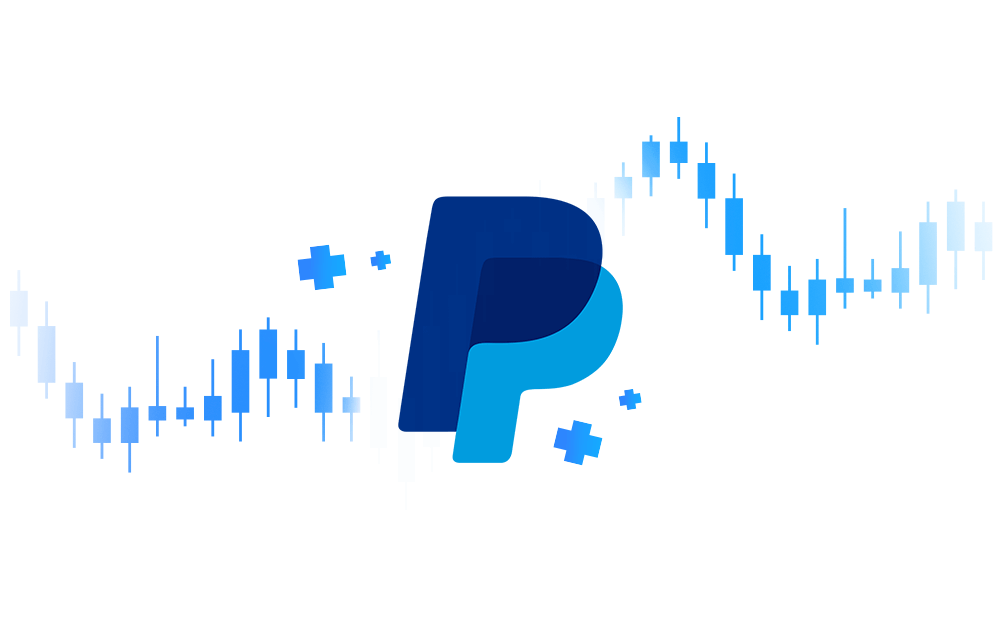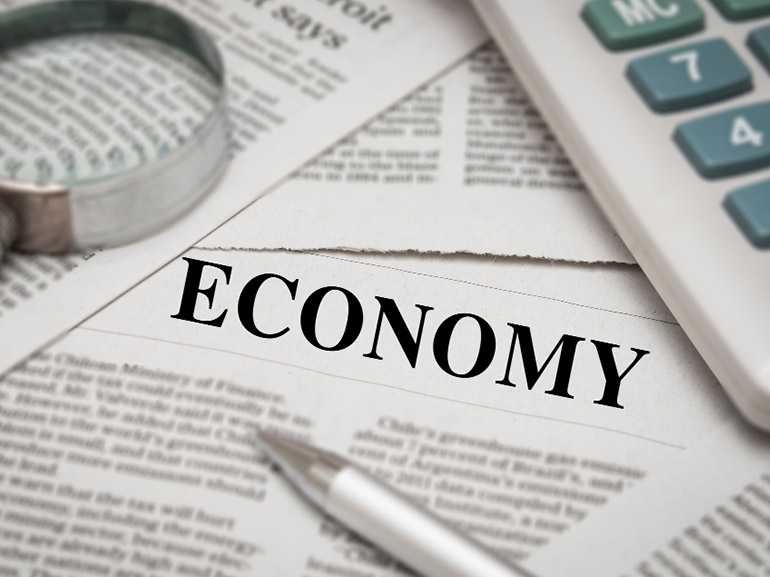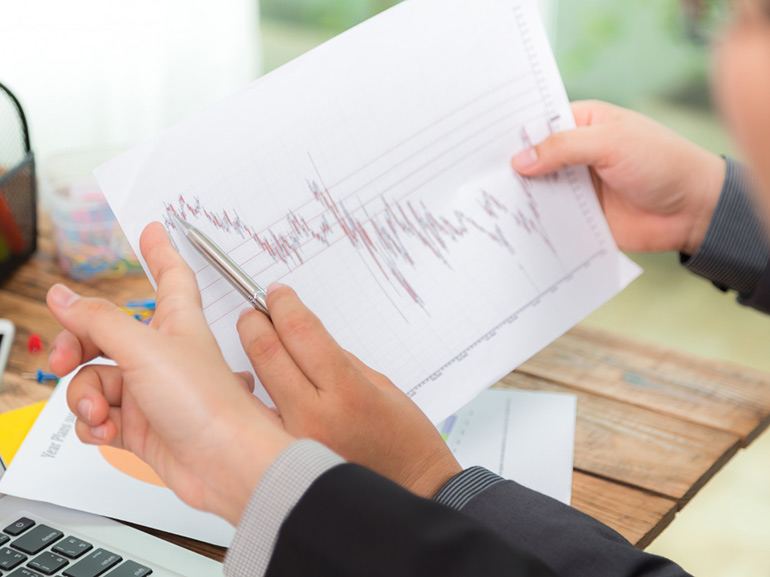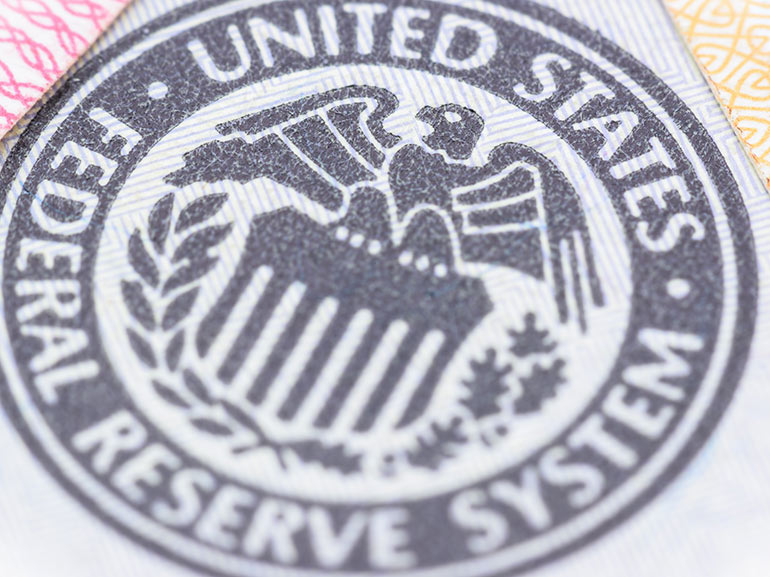PayPal Explained: An Introduction to PYPL Stock Trading
Date Modified: 08/09/2024
PayPal Holdings Inc., a Fortune 500 company, is one of the biggest and most popular online payment platforms, with 427 million active accounts. This article explores various aspects of PayPal Holdings (PYPL), including its stock performance and the factors that affect the company’s growth.

Main Points:
- PayPal is a global digital payment platform that caters to both customers and enterprises.
- PayPal was formed in 2000 by a merger of Confinity and X.com and is now worth a market capitalisation of $63.05 billion.
- The market for global payment networks is estimated to be USD 2.85 trillion in 2024 and is expected to reach USD 4.78 trillion by 2029, with a CAGR of 10.88%.
- Traders can gain exposure to the price movement of PayPal stocks through share dealing, contracts for differences (CFDs), or exchange-traded funds (ETFs).
What Is PayPal and How Is It Used?
PayPal Holdings, Inc. (PYPL) is a leading digital payments platform facilitating online transactions between individuals and businesses globally. PayPal pioneered the online payment industry to make money work efficiently and now provides various financial products and services for both individuals and enterprises.
PayPal Key Products and Services
Here are the products and services offered by PayPal, categorised into two segments:
- PayPal for Personal Use
- PayPal for Small Businesses and Enterprises
PayPal for Personal Use
PayPal provides specialised products and services tailored to individual needs:
- For Shopping & Rewards, PayPal offers:
Buy Now, Pay Later: A flexible payment option that allows users to buy and pay for items later.
Rewards: Programs that offer cashback, discounts, and other rewards for using PayPal.
Credit and Cards: PayPal Credit and various credit card options for purchasing.
Paying with PayPal: Easy and secure payment methods for online and in-person transactions. - For Sending & Receiving Money, PayPal offers:
Transfer funds to family and friends.
Payment requests from others.
Selling online, including invoicing and payment processing. - For Money Management, PayPal offers:
Payment of utility bills and other expenses.
Savings to achieve financial goals.
Cryptocurrency sales and purchases.
PayPal for Small Business and Enterprises
PayPal offers the following financial services:
- Business debit card for business expenses.
- Business loans for small businesses.
- Working capital loan for small businesses.
- Fundraising for non-profits.
PayPal also provides products for business operations, including:
- Risk management and fraud detection tools.
- Financial reporting and analytical tools.
- Bulk payments to employees or contractors.
- Integrated shipping solutions.
Overview of PayPal, Inc. History and Key Developments
PayPal Early Days (1998 – 2000):
Confinity and X.com, which later merged to form PayPal, started independently by developing competing financial products. Later, in 1999, Confinity rolled out the first version of PayPal.
PayPal Merger and IPO (2000 – 2002):
PayPal's story began with the merger of Confinity and X.com in March 2000. The combined entity initially operated under the X.com name before transitioning to PayPal. While eBay Inc. initially embraced PayPal, it later launched its payment service, Billpoint, igniting a competitive rivalry. Despite this challenge, PayPal secured significant funding and achieved a successful IPO in February 2002.
Ebay Acquisition and Continued Expansion (2002 – 2010):
In a strategic move, eBay acquired PayPal via stock-for-stock transaction in October 2002. While this move bolstered eBay's payment options, it also fueled a period of rapid expansion for both PayPal and its user base such that PayPal's growth even outpaced eBay’s.
Strategic Expansion (2010 – 2014):
In the mid-2010s, PayPal aggressively expanded into micropayments, mobile payments, and in-store transactions. Partnerships with major financial institutions, focusing on international markets alongside tools for small businesses, became a focus. Notably, PayPal also acquired Braintree, a leading payment gateway.
PayPal Exit and Continued Evolution (July 2015 – 2024):
Following PayPal's exit from eBay in 2015, it began trading on the NASDAQ with the ticker symbol "PYPL. In 2019, PayPal made headlines as the first foreign online payment platform in China. The company also introduced "Checkout with Crypto" to secure cryptocurrency payments using the PYUSD stablecoin.
PayPal and the Digital Payments Industry
A digital payment, also known as an electronic payment, involves moving value from one payment account to another using a digital device or platform.
The payment industry ecosystem comprises various stakeholders, technologies, protocols, and governing regulations. Its primary function is facilitating seamless, secure, and efficient transactions between customers, businesses, and financial institutions.
In the segment of online payment financial technologies (among e-commerce platforms), PayPal still dominates the market worldwide in 2024, holding a market share of 45 percent. Coming in second place is Stripe, with a market share of approximately 21 percent.
However, in terms of global payment network capabilities, MasterCard Inc. (MA) dominates the market, followed by Visa (V) and PayPal, which is in third place.
The Asia Pacific region is the largest and fastest-growing market for global payment networks. Estimates in 2024 reveal that the online payments industry is worth $2.85 trillion. By 2029, projections indicate it will reach USD 4.78 trillion, representing a compound annual growth rate of 10.88%.
PayPal Financials and Stock Performance Overview
After briefly exploring PayPal's position in the digital payments market, it is important to grasp the company’s performance indicators.
PayPal (PYPL) Stock Market Performance
- PayPal All-Time High: Post-COVID, in July 2021, PayPal's stock price reached an all-time high of $310.
- PayPal Long-Term Performance: As of July 2024, PayPal stock price declined -1.86% YTD, but overall in 2023, the stock lost -16.41%.
- PayPal 52-Week Range: In 2023, PayPal's stock price fluctuated between $50.25 and $76.54 per share. This indicates a 52-week range of $26.29.
PayPal (PYPL) Market Capitalisation and Outstanding Shares
- As of July 2024, PayPal had a market capitalisation worth $63.05 billion.
- In addition, the company holds 1.05 billion shares outstanding and has a public float of $1.04 billion, meaning that PayPal’s shares are very liquid for public trading.
PayPal (PYPL) Earnings Performance
- As of mid-2024, PayPal had positive earnings per share (EPS) of $3.97, indicating that the company was operating on profit. However, this might change in the future.
- In addition, PayPal's price-to-earnings ratio (P/E) was also positive in mid-2024 at 15.16. However, this reflected a depressed valuation when compared to other tech stocks.
Strengths and Growth Opportunities of PayPal, Inc.
New Leadership: Since October 2023, Alex Chriss has been PayPal's CEO, and the company has focused on transforming its business operations to be more efficient. The positive impact of this leadership change is evident in PayPal's operating margin in Q1 2024, which was close to its highest in a few years.
Increasing Revenue: PayPal Holdings annual revenue for 2021 was $25.371B, an 18.26% increase from 2020. Its annual revenue for 2022 rose to $27.518B and $29.771B in 2023, reflecting a consistent increase.
Increasing Payment Volume: In 2024, total payment volume across PayPal platforms and services rose significantly, contributing to a revenue increase that has outperformed expectations
Positive Profit Capabilities: Due to growth in revenue and GAAP earnings per share (EPS) in Q1 2024, which surpassed the management's initial guidance, the management raised 2024 full-year guidance from flat to mid- to high-single-digit growth. This positive, forward-looking statement demonstrates the company's ability to generate profits even in challenging conditions.
Innovation: PayPal's continued innovation in payment solutions, such as expanding cryptocurrency services and its buy now, pay later (BNPL) offerings, is poised to attract more users and increase transaction volumes.
What Are the Challenges Facing PayPal, Inc.
Stock Underperformance: PayPal's stock has declined nearly 3% year to 2024, missing out on the broader market gains, with the S&P 500 up by 15.50%. This reflects a lack of growth catalysts and a decline in active customer accounts.
Earnings and Revenue Growth Concerns: As of 2024, PayPal's revenue growth rate has significantly deteriorated since 2021, with a 66.90% drop in the year-over-year growth rate compared to pandemic levels. The projection of only 6.50% year-over-year growth in net revenue for Q2 is below market consensus, causing concern among investors.
Competition from Apple (AAPL): Apple's introduction of "Tap to Cash," a peer-to-peer payment feature, poses a significant threat to PayPal's efforts to monetise Venmo. With over half of global iPhone users activated Apple Pay, Venmo faces substantial competitive pressure.
Declining Margins: PayPal's operating and net income margins have declined from over 20% post-pandemic to mid-teen ranges in recent quarters. This decline is partly due to the slowdown in net revenue growth and has prevented bullish sentiment on the stock.
How to Trade PayPal Shares
Traders and investors can gain exposure to PayPal's stock price movement through share dealing, CFD trading, mutual funds, and exchange-traded funds (ETFs).
What Is PayPal Share Dealing?
Share dealing in PayPal Holdings, Inc. (PYPL) involves buying and holding PayPal stock through a brokerage firm for a medium to long-term timeframe. The aim is to profit through two potential avenues:
- Stock Price Appreciation: Ideally, the price of PayPal's stock will rise over time. Therefore, selling your shares at a higher price can result in capital gains.
- Future Dividend Potential: Established companies often distribute a portion of their profits as dividends to shareholders. However, PayPal doesn't currently pay dividends; it might offer them in the future.
What Is PayPal Online CFD Trading?
Online share CFD trading allows for active speculation on PayPal stock price movements through platforms like Plus500. Unlike share dealing, this approach caters to people who are comfortable with short-term trading and they are able to tolerate the risks inherent to CFD trading. Instead of directly owning PayPal shares, online share CFD trading utilises Contracts for Differences (CFDs). These financial instruments mirror the underlying asset's price movements (PayPal stock) but don't involve direct ownership.
Share CFDs offer two ways to trade PayPal's stock price movements:
- Going Long (Buy): If you believe that the price of PayPal's shares will rise. If PayPal's stock price increases, you make a profit.
- Going Short (Sell): If you believe that the price of PayPal's shares will fall. If PayPal's stock price decreases, you make a profit.
A trader can also experience losses if the market moves against their position.
Mutual Funds
Mutual funds pool money from multiple investors to purchase a diversified portfolio of stocks, bonds, or other securities. Investing in mutual funds that include PayPal shares provides exposure to PayPal's stock price movements along with other assets. This approach offers diversification and professional management, reducing the risks associated with investing in individual stocks.
Exchange Traded Funds (ETFs)
ETFs are investment funds that trade on stock exchanges, similar to individual stocks. They can track a specific index, commodity, or basket of assets. Investing in ETFs that include PayPal shares allows investors to gain exposure to PayPal's stock price movements while benefiting from the diversification of the ETF's broader portfolio. Such ETFs include Invesco QQQ ETF (QQQ), Vanguard 500 Index Fund (VOO), SPDR S&P 500 ETF Trust (SPY), etc.
If you are interested in the rising and falling prices of PayPal shares, check out PayPal CFD at Plus500.
Conclusion
PayPal Holdings (PYPL) stands as a pioneer in the digital payment space, continuously evolving to meet the demands of a global and interconnected economy. The company's innovative approach to financial technology, including ventures into cryptocurrency and partnerships with major financial institutions, underscores its commitment to staying at the forefront of the industry. For traders and investors, PayPal represents an opportunity to gain exposure to the ever-evolving fintech sector. You can make well-informed decisions about potential trading opportunities with PayPal shares by considering key factors such as financial performance, technological advancements, and competitive pressures.
FAQs
PayPal (PYPL) shares experienced a volatility rating of 6.75% in 2024. This may change later in 2024 or in the future.
Up till July 2024, PayPal Holdings Inc. does not pay dividends to its shareholders.
The decision to buy or sell PayPal stock requires a thorough evaluation of both technical analysis and fundamental analysis.
Learn More About PayPal
Related News & Market Insights
Get more from Plus500
Expand your knowledge
Learn insights through informative videos, webinars, articles, and guides with our comprehensive Trading Academy.
Explore our +Insights
Discover what’s trending in and outside of Plus500.
Stay up-to-date
Never miss a beat with the latest News & Markets Insights on major market events.


